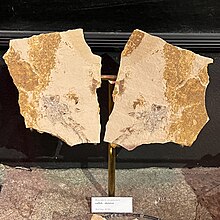| Hypsidoris Temporal range:
| |
|---|---|

| |
| Hypsidoris fossil | |
|
Scientific classification
| |
| Domain: | Eukaryota |
| Kingdom: | Animalia |
| Phylum: | Chordata |
| Class: | Actinopterygii |
| Order: | Siluriformes |
| Suborder: | Siluroidei |
| Superfamily: | † Hypsidoroidea |
| Family: | †
Hypsidoridae Grande, 1987 |
| Genus: | †
Hypsidoris Lundberg & Case, 1970 |
| Type species | |
| Hypsidoris farsonensis Lundberg & Case, 1970
| |
| Species | |
|
Hypsidoris farsonensis | |
Hypsidoris (from Greek: ῠ̔́ψος hypsi, 'height' and Greek: δῶρις dôris 'dagger') [1] is an extinct genus of catfish, classified within its own family Hypsidoridae, from the Eocene epoch of North America.
Hypsidoris was about 20 centimetres (7.9 in) long, and looked similar to the modern catfish, also possessing sensitive barbels used to detect prey in murky waters. It also had a vibration-sensitive organ called the Weberian apparatus, which consisted of specialized vertebrae at the front of the spinal column which passed vibrations to the inner ear, using the swim bladder as a resonance chamber. For defense against predators, Hypsidoris had large spines at the front of each pectoral fin. Like modern catfish, it would probably have eaten smaller fish, along with crayfish and other bottom-dwelling creatures. [2]
There are two species. H. farsonensis is from the Early Middle Eocene of Wyoming and H. oregonensis is from the Middle Eocene of Oregon. [3]
References
- ^ Lundberg, John G.; Case, Gerard R. (1970). "A New Catfish from the Eocene Green River Formation, Wyoming". Journal of Paleontology. 44 (3): 452. ISSN 0022-3360. JSTOR 1302580.
- ^ Palmer, D., ed. (1999). The Marshall Illustrated Encyclopedia of Dinosaurs and Prehistoric Animals. London: Marshall Editions. p. 40. ISBN 1-84028-152-9.
- ^ Nelson, Joseph S. (2006). Fishes of the World. John Wiley & Sons, Inc. ISBN 0-471-25031-7.